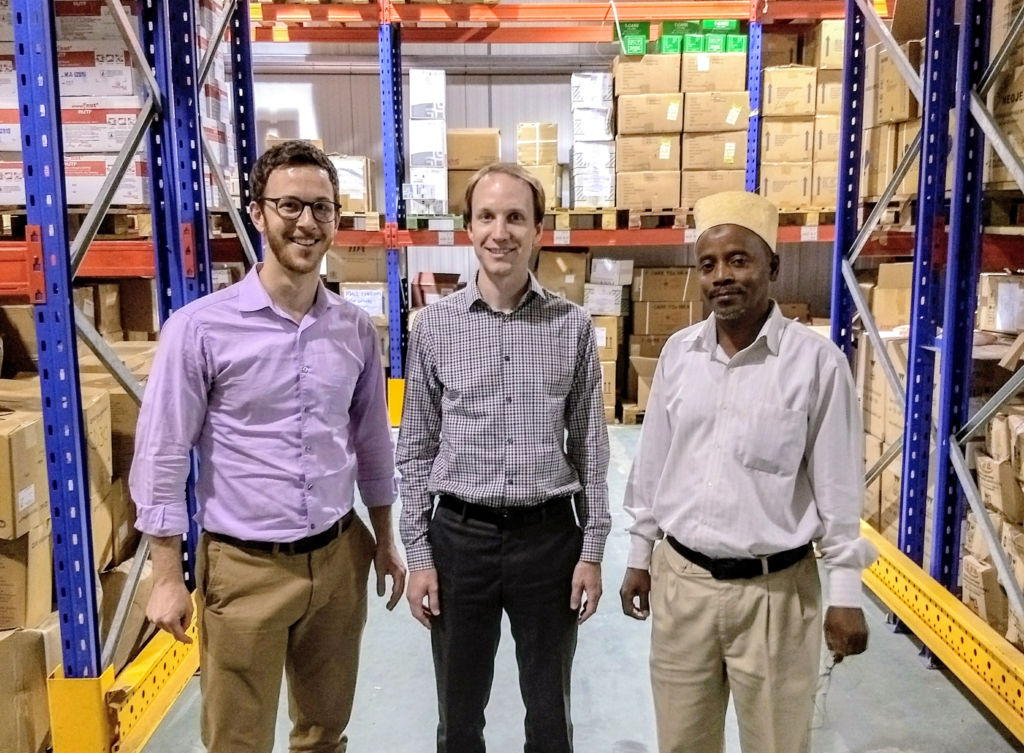WDI Works to Strengthen Tanzania’s Medical Supply Chain System
Tuesday, January 8, 2019

WDI’s Michael Krautmann (left), Ben Davis (center) and manager of a medical commodities warehouse in Zanzibar.
The Global Health Supply Chain Technical Assistance (GHSC TA-TZ) project, funded by the U.S. Agency for International Development (USAID), aims to strengthen Tanzania’s health supply chain systems across different disease programs.
Two research managers from WDI’s Healthcare focus area, Michael Krautmann and Ben Davis, conducted a midterm review of this project to assess whether it is on track to meet its objectives, and also to make recommendations for any necessary course-correcting actions.
GHSC TA-TZ marks a fundamental shift in USAID’s approach to health supply chain technical assistance in Tanzania. Previous projects, such as Supply Chain Management System (SCMS) and USAID | DELIVER Project, focused significant resources on strengthening the health supply chain by providing detailed and direct operational support to the government for key supply chain functions. GHSC TA-TZ seeks to move U.S. government-funded technical assistance away from this type of operational role and toward a more strategic, advisory role. Thus, the first two years of GHSC TA-TZ have focused heavily on transitioning certain supply chain management activities to government ownership.
After completing a thorough desk review of relevant documents and developing an overall methodology, Krautmann and Davis traveled to Tanzania to gather information from health supply chain stakeholders. They conducted more than 35 interviews with more than 60 individuals – from government ministry officials to internal project staff and implementing partner representatives. The interviews, which took place in the cities of Dar es Salaam and Dodoma as well as the nearby island of Zanzibar, provided the type of qualitative information not available in existing documents.
“During interviews, we focused on understanding what the project is doing well and what could be improved,” Krautmann said. “And we solicited interviewee expectations for the project’s remaining years. Between the desk review and interviews, we were able to get a holistic picture of the project.”
GHSC TA-TZ operates in a challenging environment. Tanzania is a large, populous country with major infrastructure challenges at the health facility level. Three separate government entities are involved in managing key health supply chain activities, making effective coordination and accountability more difficult and complex to achieve.
“One of the challenges is how to transition health supply chain functions effectively to the government, especially when these functions are split between ministries,” Krautmann said.

Davis and Krautmann with Zanzibar Ministry of Health’s Supply Chain Management Unit.
Despite these challenges, the GHSC TA-TZ has already made significant contributions to key health supply chain performance metrics such as forecast accuracy, facility reporting rates and, most importantly, product availability at health facilities.
As part of the review, Krautmann and Davis provided GHSC TA-TZ project leadership with a list of actionable recommendations for addressing current risks to project success while also facilitating the project’s transition toward a strategic advisor role. The recommendations drew upon the types of business principles that are the foundation of WDI’s approach. Whether the application of lean thinking, developing mutually-reinforcing organizational capabilities, or analyzing the incentive structures within performance-based contracts, their recommendations sought to leverage private-sector and academic knowledge to benefit Tanzania’s public-sector health supply chain.
Krautmann said WDI was well equipped to handle this project.
“Through our prior work we have a broad, strategic view of the global health supply chain landscape, and we also have on-the-ground experience that allows us to operate effectively with government ministry officials,” he said. “Moreover, we have enough experience working with clinic staff on supply chain issues to be able to predict how things will play out when these national-level policies filter down to the clinic level.”
